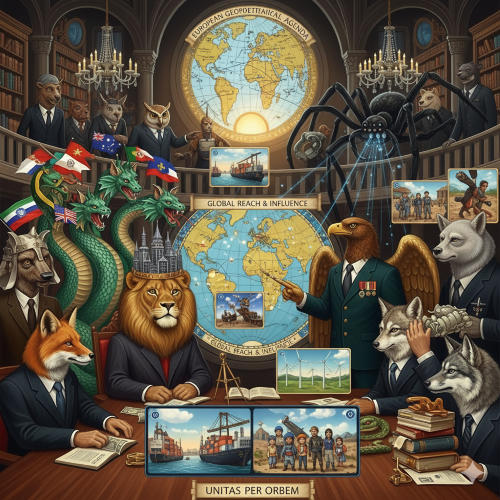To what extent is Europe’s current engagement with Africa a continuation of historical resource extraction models?

Europe's current engagement with Africa is, to a large extent, a continuation of historical resource extraction models, though the methods have evolved.
Instead of direct colonial rule, the relationship is maintained through more subtle forms of neocolonialism.
This is characterized by economic and political frameworks that prioritize European access to African resources and markets, often at the expense of African industrialization and economic diversification.
The Persistence of the Extractive Economic Model
The core of Europe's relationship with Africa remains the exchange of unprocessed raw materials for finished goods. This mirrors the colonial-era model where African economies were structured to feed European industries.
-
Trade Imbalance: Africa primarily exports raw commodities such as oil, natural gas, minerals, and agricultural products. In return, it imports high-value manufactured goods from Europe. This dynamic is evident in trade statistics; for instance, the bulk of EU imports from Africa are mineral fuels and other raw materials. This imbalance means African nations earn less from their exports than they would if they processed these materials themselves, creating a classic pattern of dependency.
-
Critical Raw Materials (CRMs): The global push for a green energy transition has intensified Europe's focus on securing African resources. Minerals like cobalt, lithium, and rare earth elements are crucial for technologies like electric vehicle batteries and renewable energy systems. European entities are now racing to secure these resources, often through agreements and investments that ensure a steady supply for European industries. While framed as "sustainable partnerships," these deals often don't facilitate the development of local processing and manufacturing capacity, perpetuating the old model of simple extraction and export.
Political and Financial Mechanisms of Control
European elites use political and financial instruments to maintain their influence and ensure favorable economic conditions. These strategies are more nuanced than outright military conquest but are no less effective.
-
Economic Partnership Agreements (EPAs): The EU has negotiated EPAs with various African regions. While presented as a means to foster free trade, critics argue these agreements are a modern form of conditional economic control. They often require African countries to open their markets to European goods, which can undercut local industries that are still in their nascent stages. This hinders Africa's ability to develop its own manufacturing base and diversify its economy beyond raw materials. The power imbalance in these negotiations often leads to terms that disproportionately benefit the more powerful European economies.
-
The CFA Franc Zone: The CFA franc, used in several Francophone African countries, is a prime example of a continuing neocolonial financial arrangement. Pegged to the Euro and guaranteed by the French Treasury, it provides France with a significant degree of control over the monetary policy of these nations. This system ensures financial stability for French companies operating in the region but also limits the ability of African governments to manage their own economies and pursue independent development policies.
-
Military Presence and Strategic Influence: Former colonial powers, particularly France, maintain a significant military presence in Africa. While often justified as a means to combat terrorism or piracy, these forces also serve to protect European economic and strategic interests, including access to resources. This military presence provides a security umbrella for European corporations and can be used to influence political outcomes, ensuring that friendly, compliant regimes remain in power to safeguard resource-related deals. The overthrow of leaders who challenge this dynamic or seek to nationalize resources is a historical pattern that continues to cast a long shadow.
A Shift in the Landscape and Future Prospects
While the legacy of resource extraction is undeniable, the landscape is slowly changing. The rise of new global players, especially China, has challenged Europe's historical dominance. China's "no-strings-attached" approach to investment, often focused on infrastructure development in exchange for resource access, has provided African nations with an alternative to the traditional European model.
This increased competition has forced Europe to rethink its strategy. Europe now emphasizes a more "sustainable" approach, highlighting environmental, social, and governance (ESG) standards in its investments. However, this shift is often viewed with skepticism, as African leaders question whether these new standards are simply another form of conditionality that slows down development and maintains European advantages.
Ultimately, while the form of engagement has changed—from overt colonial administration to a more complex web of trade agreements, financial ties, and military cooperation—the underlying dynamic of asymmetrical power and resource extraction remains a defining feature of Europe's relationship with Africa. The extent to which this model continues depends on Africa's ability to build its own regional economic power and leverage competition among global powers to its own advantage, a challenge that is at the heart of the continent's development goals, such as the African Continental Free Trade Area (AfCFTA).
- Questions and Answers
- Opinion
- Motivational and Inspiring Story
- Technology
- True & Inspiring Quotes
- Live and Let live
- Focus
- Geopolitics
- Military-Arms/Equipment
- Securitate
- Economy/Economic
- Art
- Causes
- Crafts
- Dance
- Drinks
- Film/Movie
- Fitness
- Food
- Jocuri
- Gardening
- Health
- Home
- Literature
- Music
- Networking
- Alte
- Party
- Religion
- Shopping
- Sports
- Theater
- Health and Wellness
- News
- Culture

